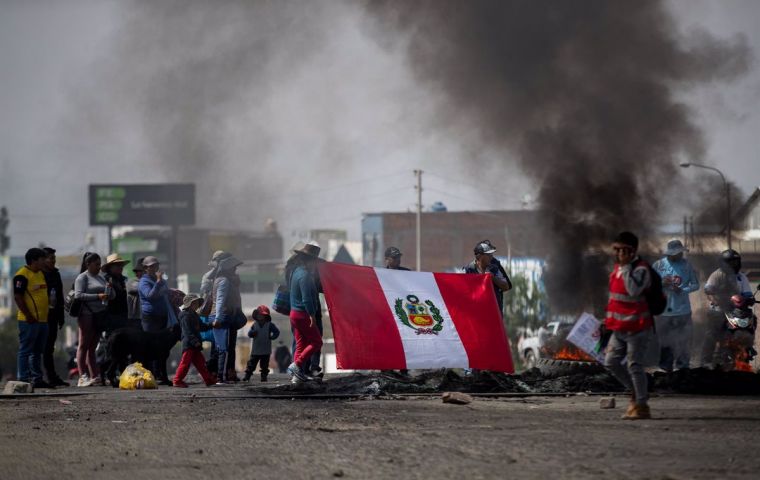MercoPress. South Atlantic News Agency
Protests and road blockades resume in Peru
 The situation is normal, except for a few road blockades, Otálora said
The situation is normal, except for a few road blockades, Otálora said Peruvian demonstrators went back to blocking roads and staging other protests nationwide over the impeachment of former President Pedro Castillo Terrones, after which 28 people have been killed.
After a truce for the holiday season, protests were resumed Wednesday. Prime Minister Alberto Otarola said the situation nationwide was “normal” despite occasional blockades in the regions of Cusco and Puno. “Protest is a right of the population, but it has to be done peacefully,” he stressed. “We are working with the police to maintain internal control,” he added. “There are 10 blockades, mainly around Puno,” Otarola also told reporters in Lima.
According to Al Jazeera, protesters Wednesday used stones and burning tires to barricade main routes in the southern regions of Puno, Cusco, Apurimac, and Arequipa, as well as in Junin.
Peruvian Police and Army guarded public buildings in areas where protests have been announced, including Ayacucho, the region where the largest number of people died in the December demonstrations. In Cusco, the railway service to the Inca citadel of Machu Picchu was suspended as a precaution, after 2,062 tourists were evacuated on Tuesday.
Peru went through a wave of protests after the impeachment and arrest of former president Castillo, in which 22 people died in clashes between demonstrators and the Army, while six others perished in accidents linked to the blockades.
President Dina Boluarte Wednesday created a “Monitoring and Crisis Control” center, together with the Ministers of Defense and Interior. “I call for peace, calm, unity to promote the development of the homeland,” she said in a speech.
The demonstrators want Boluarte's removal from office, in addition to fresh elections and the creation of a Constitutional Assembly.
Former Vice President Boluarte took over on December 7 after the country’s opposition-held Congress overwhelmingly voted to remove Castillo, who had announced he was dissolving Parliament and would rule by decree pending new elections and the Constitutional Assembly, which is consistent with the people's demands. Castillo's move was dubbed a coup d'état leading to his impeachment.
He was then arrested and is now in pretrial detention for 18 months facing rebellion and conspiracy charges.
Boluarte's government has agreed to bring forward elections set for 2026 to April next year, but most demonstrators are unwilling to wait that long.




Top Comments
Disclaimer & comment rulesCommenting for this story is now closed.
If you have a Facebook account, become a fan and comment on our Facebook Page!